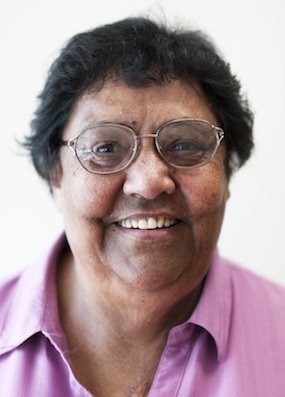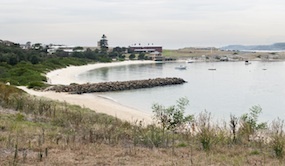Growing old well: improving the health and longevity of Aboriginal people
Our research into healthy ageing is providing evidence to help improve the health and longevity of Aboriginal people.
Long time La Perouse resident, Valerie Ardler, hasn’t quite gotten used to being called an elder by her community. She is, as she puts it, “not that old yet.”
“But then, when I think about it, my nephew is nearly 50, so I must be getting old,” she laughs.
A member of the ‘La Pa’ Aboriginal community, Valerie has lived in this southern Sydney suburb, located on the headland at Botany Bay, for most of her life. The role of community leader has come to her, she says, because there just aren’t many of the older generation left.
“We’ve lost a lot of old people, all our elders are gone. A lot of them had diabetes,” she says. “We’ve only got one left, an elderly lady, she’s nearly 90.”
At 67, Valerie has accumulated her own war wounds, having survived breast cancer, a double mastectomy and triple bypass surgery, all in the last ten years.
“I have a big cross on my stomach and my chest,” she says. “Last year was the only year since 2001 that I haven’t had an operation.”
Her mind and memory, however, are thankfully still sound. An old friend, says Valerie, has not been so lucky.
“She keeps asking me the same questions all the time. She still drives a car, and I worry about her driving on her own. I wonder if she remembers where she parks the car. I find that there’s a lot of that going around now, memory problems. That’s one thing I wouldn’t like to get.”

Measuring dementia
Researchers have predicted that over the next few decades the incidence of memory problems and dementia will increase dramatically. While there’s a good sense of how dementia will affect the general population, we know very little about how Aboriginal Australians will be specifically affected.
One of the few studies that exists, conducted in remote communities in Western Australia’s Kimberley region, found that Aboriginal people are almost five times more likely to suffer from dementia than other Australians. Little is known, however, about dementia in Aboriginal people living in cities and smaller towns.
That may all be about to change. La Perouse is one of five Aboriginal communities in NSW participating in the Koori Growing Old Well Study, an initiative of Prof Tony Broe, a senior scientist at NeuRA.
With the help of approximately 600 Aboriginal participants aged 60 years and over, the Koori Growing Old Well team is looking into what leads some people to develop age-related problems like memory loss, and what helps other people to retain their health and wellbeing into old age. They will also investigate the relationship between cognition and other age-related diseases, such as heart, lung and kidney disease, hypertension and diabetes.
The team will gather data through a series of interviews, as well as neuropsychological and medical assessments. The interviews with participants cover early life factors that could affect physical health and brain function later in life, such as issues in pregnancy and birth, education and parenting. They will also enquire about mid-life factors, such as high blood pressure, diabetes, alcohol and drug use, job experience and training, and later life factors including access to aged care services.
The cognitive and medical assessments will identify how many of the 600 people are at risk of developing dementia or cognitive impairment.
Prof Tony Broe says he hopes the research will help reduce the gap in life expectancy between Aboriginal people and the general population by identifying why many communities experience such high rates of chronic disease.
“There is a real need to improve care for older Aboriginal people as well as to ensure that they actually reach old age,” says Prof Broe.

A healthy awareness
“We had a breast cancer awareness session last year and I got up and spoke about how, if you catch it earlier, you’ll live longer. I couldn’t believe it when I found out that some of my friends don’t go for mammograms. A lot of them got the message though, because now they’ve put their names down to get one.”
Valerie says she feels it’s her responsibility as an elder to get people to start thinking about their health.
“At first, when I had cancer, people were uncomfortable. I’d go and watch my nephew play football on Sundays, and people would move away because they didn’t know how to talk to me.”
“Now, people come up to me because they can see how good I’ve come. I can sit there now and they’ll ask me things. When I tell them, they go and get a check-up. I find that I’m helping them and that’s why I keep telling them.”
For Valerie, participating in the Koori Growing Old Well study is one more way to promote the value of keeping healthy to her community.
“I’m just glad that I can be helpful, because they need to find out these things about health and getting older. Otherwise, how are they going to learn, especially about my people?”